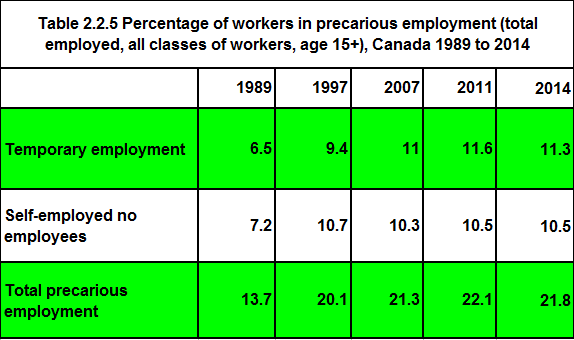Percentage of workers in precarious employment (total employed, all classes of workers, age 15+), Canada, 1989 to 2014

Source: CICH table created using data from Poverty and Employment Precarity in Southern Ontario, McMaster University and United Way Toronto. The Precarity Penalty. The impact of employment precarity on individuals, households and communities ―and what to do about it. https://pepsouwt.files.wordpress.com/2012/12/precarity-penalty-report_final-hires_trimmed.pdf – accessed July 15, 2017.
Many parents with children who live in low income have precarious work.
Precarious work refers to jobs with high levels of uncertainty surrounding compensation, scheduling, and future employment 1.
It is estimated that over 2 million Canadians find themselves in precarious and temporary employment today, and the majority of new jobs being created in Canada are precarious in nature1.
On average, workers in precarious jobs earn between $11,600 and $18,000 less per year than people in comparable permanent positions1.
The percentage of workers in Canada who have precarious employment is rising. For example, in 1989 there were 6.5% of all workers in temporary employment compared with 11.3% in 2014. This is a 75% increase.
1Poverty and Employment Precarity in Southern Ontario, McMaster University and United Way Toronto. The Precarity Penalty. The impact of employment precarity on individuals, households and communities ―and what to do about it. https://pepsouwt.files.wordpress.com/2012/12/precarity-penalty-report_final-hires_trimmed.pdf – accessed July 15, 2017.
Implications
Precarious jobs are unsecure, part-time, stressful, do not have benefits, may be risky – and provide little room for advancement. All of these factors create stress for parents of young children. Precarious employment makes it difficult for parents to do the things that would best support their children – spend time with them, provide quality child care and budget for housing, food, etc.2
2Campaign 2000 Report Card on Child & Family Poverty in Canada, 2016. A Road Map to Eradicate Family Poverty. http://campaign2000.ca/wp-content/uploads/2016/11/Campaign2000NationalReportCard2016Eng.pdf accessed June 15, 2017.
